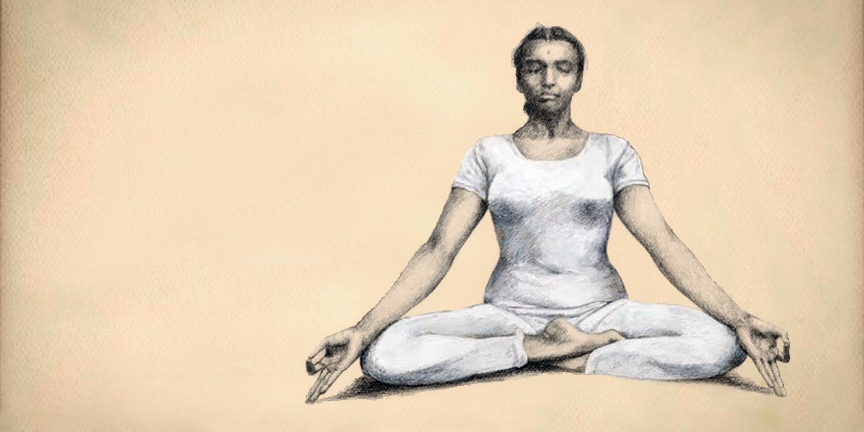
I was introduced to a workflow solutions software called Asana at a recent work meeting. Some of my colleagues were referring to it as uh-sāh-nuh instead of its Sanskrit pronunciation āh-suh-nuh, which puzzled me since they are all serious practitioners or teachers of yogasana themselves and have no trouble pronouncing it otherwise. As an Indian and the only person of color at the meeting, I felt a visceral response to the colonial (mis)pronunciation of asana that was being bandied about. But I subdued myself with the thought that I might be missing something – maybe it is unrelated to the yogic asana and has a different meaning. So I decided to look up the context behind this product’s name, which I did later on its website. I discovered that it was built by two Silicon Valley software engineers (not of Indian origin) and that it is indeed named after the Indian Sanskrit word asana.
The company’s website says – “(Its founders) found inspiration in Buddhist principles to center and guide the product they wanted to build: bringing ease, focus and flow to a world otherwise filled with chaos. Asana is a Sanskrit word that refers to the place and posture in which a yogi sits. A pose requires marrying form and flow, staying centered while moving through distractions.”. This all looks harmless. Yet I notice that while it credits Buddhist principles for their inspiration, asana is not a Buddhist principle. In fact, it predates Buddhism. Asana is one of many principles from the spiritual philosophy and practice of Yoga (pronounced yo-guh), which in turn is one of six major traditional philosophies of Hinduism. There is no mention of or credit to any of this. To me, it is a noteworthy omission.
Then the website goes on to say – “We typically pronounce Asana with the emphasis on the second syllable: uh-sāh-nuh. But we’re not prescriptive about it. We welcome other pronunciations too, including the Sanskrit pronunciation āh-suh-nuh.”.
Here, they lost me. Let’s get this straight – they do not have difficulty in pronouncing asana. It is not even a difficult word to pronounce. They just prefer to say it differently. This bothers me. I mean, how would you feel if I told you that I really like a word that carries deep meaning for your people, and has been a part of your cultural heritage and spiritual traditions for thousands of years, BUT I just prefer to pronounce it differently? Worse still, I have the resources and global platform to magnify this effect and influence others to say as I say!
So it is here. They have co-opted the Indian Sanskrit word asana to show their connectedness and worthiness. They are using its common English spelling as their brand name to capitalize on its immense, preexisting popularity. But their preference is to pronounce it differently, or in other words to intentionally mispronounce it. Why do this? To show or enhance their uniqueness, coolness and desirability, or because they like how it sounds? Whatever their reason, it is nonessential and image-oriented. And this show is for themselves and the people they depend on for their upward mobility, not for those who value or practice authentic yoga based in traditional principles. Their casual alteration of the pronunciation of asana shows utter disregard for the austerity and sanctity with which this word is held in the culture they plucked it from. They likely paid a lot to get it as their domain and business name. Does this justify their entitlement and sense of ownership? Does it grant them the privilege to pronounce it as they like? They must have an inkling that they are crossing certain boundaries because they concede and “welcome” the Sanskrit pronunciation (as if we need their permission). But in their confused state, they add injury to insult by welcoming “other pronunciations too” in addition to the Sanskrit one, which only deepens the trivialization of Indian spiritual culture by conveying that anything goes and how you say asana does not matter. Send help!
As well-intentioned and reasonable as this may seem on the surface, it is in effect damaging, rude, exploitative and self-serving. If this company actually appreciates asana, why not keep it intact, accurately credit its origins, do more to educate others about Yoga and be alright with saying it the way it has been pronounced for thousands of years? That would be an honest and respectful effort to appreciate Indian yogic culture as an outsider.
Instead, what they accomplish here is a misguided emulation that underscores the problematic disconnect between the principles of traditional yoga practice and the way yoga is packaged, viewed and practiced in modern Western society. Most people in the West first know yoga as the physical practice of postures, or asana, to the point where these two words are being used synonymously. Asana has become the most prominent limb of yoga, used mainly to attain greater physical strength and health, promote ideals of beauty, and to boost one’s public image and ego. Ironically, classical yoga texts caution us against focusing on such external factors because they deepen our illusion (maya) and suffering (duḥkha) and distract us from the true aim of yoga, which is to achieve one’s highest Self free from the dominance of ego. The current use of asana with an emphasis on physicality and appearance goes against traditional yogic teachings. Physical well-being is important but it is not the ultimate goal. It is only a vehicle for connecting to a higher state of enlightenment.
I have been asked in the past about what cultural appropriation is in the context of yoga. This is a solid example of it.
How is it cultural appropriation?
They have taken an element of deep value and significance from another culture, altered it in a way that would not be condoned within that culture, marketed and used it in a manner that suits them but actively harms and compromises the integrity of the original.
The issue is exacerbated by the fact that this is a sizable global company with a much greater sphere of influence than the average individual, and the element that has been co-opted and altered is a revered word with spiritual connotations from a historically subjugated culture. The yoga that we so freely practice today was once ridiculed and prohibited in India under British rule and colonization. Recognize the role of power and the legacies of imperialism when seeking to better understand cultural appropriation.
How is it harmful?
The original pronunciation of asana should not have to compete with or defend itself against this insidious variant. Because of this company, there is now an ever-growing population of people who know next to nothing about asana or yoga but are familiar with the ‘uh-sāh-nuh’ software. Inevitably, some of these folks will school others along the way to say it like them. This conflicts with the efforts of those teachers of Yoga who have cultivated cultural authenticity by genuinely immersing themselves in the traditional practice and maintaining connectivity with the classical texts, and who work very hard (typically earning very little) to preserve and relay knowledge of the original teachings and core values for the benefit of all.
While this company offers the disclaimer that it doesn’t prescribe its pronunciation over the original, I witnessed first-hand its pervasive and corrupting influence when even the well-meaning yoga practitioners at my meeting went with uh-sāh-nuh instead of the Sanskrit pronunciation they know very well. The altered pronunciation of asana, which has been in active circulation since this company’s inception a while ago, has now acquired a substantial following and become normalized due to its considerable global reach. Some unsuspecting adopters of its software are likely to be under the false impression that its name is different from the Indian Sanskrit asana, and so it needs to be pronounced differently. After all, how many people would actually look into this some more as I did? The easily-missed partial credits given to the source of its name, along with the disclaimer that it is “not prescriptive” about pronunciation, does little to save the original asana from the wrecking ball that this company has taken to it by mass propagating its mispronunciation.
Those who posit that a slightly modified pronunciation of asana hardly matters are missing the context and significance of the spoken word, sound and the oral tradition of knowledge transfer in Indian spiritual culture. Yoga happens to be a part of the Vedas in the vast universe that is ancient Indian spiritual literature. The Vedas are also known as Shruti – meaning ‘that which is heard’ – because they were orally composed and communicated in the form of poetic Sanskrit hymns, without the use of script, by the ancient seers who brought forth these teachings. Special recitation techniques employing fixed words and fixed tonal sounds were used to aid listening and memorization, and to ensure accurate transmission of Shruti across generations. This continued to be the system of relaying and learning the Vedas for thousands of years in an unbroken line from guru (teacher) to shishya (student), with teachers being the main custodians of knowledge and its practice. It was only around 500 BCE that the Vedas began to be compiled into written texts, for their assimilation in the absence of a teacher. To this day, these scriptures continue to be recited by Vedic students exactly as they were originally conveyed by their creators. Such is the effectiveness of this oral tradition in preserving ancient Indian literature.
What We Can Change
Cultural exploitation and our toleration of it is a highly contagious disease. It mutilates inter-cultural relationships by eroding mutual trust and respect, and debilitates cultural integrity and preservation. This is not hyperbole considering the delusion, chaos and damage that half-baked knowledge and misinformation is already creating in society today. So this matters profoundly. Like Patanjali said, “Heyam dukhamanagatam” (Yoga Sutra II.16). Suffering that is yet to come can and must be avoided.
Yoga is recognized by UNESCO as an intangible cultural heritage asset of India, with the aim of better safeguarding it and promoting awareness of its significance. Yet this does not preclude its appropriation and misuse. This makes me realize that it is ultimately up to us – teachers and students of yoga – to be the agents of its preservation. Because if not us, then who? Our practice of yoga already gives us the presence and sensitivity to notice what we see. We can develop the ethical responsibility to acknowledge and call out exploitation when we encounter it so that it can be eventually stopped. We need to use our voices and platforms for this, both individually and collectively. This is not convenient or comfortable but our practice of yoga has already trained us to observe and resolutely work with our challenges, and overcome them more often than not.
I hope that we will not take the bait to intentionally mispronounce asana, or any other spiritually significant or traditional word from another culture. For this, we need to stay alert and curious, employing credible sources to learn more about aspects of other cultures that we come by and before we start using them in our own lives. If you notice your own culture’s heritage assets being abused, whether deliberately or due to ignorance, I hope that you will speak up. Talking about it with the people who we call our tribe or through the avenues that are available to us will encourage discussion, amplify awareness and effect positive change.
And to anyone whose intention is to respectfully utilize the word asana, start by saying it like my ancestors did – āh-suh-nuh!
Namaste.
Note: Sanskrit is an ancient classical language, not a modern evolving one, and it merits preservation. It has precise rules around grammar, spelling and pronunciation. In Sanskrit, every letter makes only one sound and every sound has only one letter. Every word is spelled and pronounced in only one way. This is what enabled Sanskrit and ancient Yogic texts to be passed on exclusively via oral recitation for thousands of years, and to be preserved effectively. Deviating from the fixed pronunciation of a Sanskrit word entirely changes its meaning. The altered pronunciation of asana actually renders this company’s name meaningless in Sanskrit.
In this article, I have chosen to refer to asana as an Indian Sanskrit word instead of simply as a Sanskrit word (as this company does on its website) because, in my opinion, the latter is impersonal, incomplete and myopic. It makes us forget that asana was conceived by people of ancient India whose language happened to be Sanskrit. I think it is important to humanize conversations about the cultural appropriation of Yoga by bringing its creators back into the picture. These were humble spiritual teachers who would not leave their name all over their works because their personal goal was not self-glorification but to rise above ego. This does not mean that we should not or need not acknowledge them and offer our gratitude and respect. We need to maintain the perspective that Yoga, and asana, would not exist without them. So I include them by qualifying that asana is an Indian Sanskrit word.
ABOUT THE AUTHOR
 Swetha Rao-Devigere is Adeline Yoga’s Student Services Administrator and a graduate of Adeline Yoga’s teacher education program. She is from Bangalore, India, where she grew up in an atmosphere of daily Vedic chanting and hymns owing to her family’s practice of Bhakti Yoga. Having been exposed to Sanskrit and multiple Indian languages from an early age, she is naturally able to read and assimilate Sanskrit texts. This ability combined with a gradual interest in Eastern philosophy led her to become an avid student of Yoga, Vedanta and Buddhist literature since 2005. After her Masters in Information Systems and working in business and tech for nearly a decade, Swetha shifted gears and committed herself to service through Yoga. In 2014 she began to earnestly practice and study Iyengar Yoga, and graduated from our 2-year teacher education program in 2018. Swetha now continues her exploration of yoga while also welcoming and supporting our students in their yoga journey. She is passionate about enabling holistic well-being and increased self-awareness through asana, yoga philosophy and mindfulness practices. In her spare time, she enjoys being in nature with her son, husband and two dogs, as well as singing at kirtans with her fellow Adeline Yoga musicians.
Swetha Rao-Devigere is Adeline Yoga’s Student Services Administrator and a graduate of Adeline Yoga’s teacher education program. She is from Bangalore, India, where she grew up in an atmosphere of daily Vedic chanting and hymns owing to her family’s practice of Bhakti Yoga. Having been exposed to Sanskrit and multiple Indian languages from an early age, she is naturally able to read and assimilate Sanskrit texts. This ability combined with a gradual interest in Eastern philosophy led her to become an avid student of Yoga, Vedanta and Buddhist literature since 2005. After her Masters in Information Systems and working in business and tech for nearly a decade, Swetha shifted gears and committed herself to service through Yoga. In 2014 she began to earnestly practice and study Iyengar Yoga, and graduated from our 2-year teacher education program in 2018. Swetha now continues her exploration of yoga while also welcoming and supporting our students in their yoga journey. She is passionate about enabling holistic well-being and increased self-awareness through asana, yoga philosophy and mindfulness practices. In her spare time, she enjoys being in nature with her son, husband and two dogs, as well as singing at kirtans with her fellow Adeline Yoga musicians.

Shari says
Please make this shareable! A wonderful article. Thank you Swetha for your guidance and clarity!
Shashi Sudhir says
Yes.bI agree giving due credit to what we borrow from other cultures and respecting them is basic human decency. It would be good to highlight this to this company. Maybe you can post these sentiments on their website and start a dialogue with them. Using your yoga institute for this dialogue would be a good strategy.
Shagun Chopra says
I am so glad you wrote this piece, Swetha. Indeed a fitting example of cultural misappropriation. My heart aches too when I see examples like this. Thank you for putting the feeling into words and offering a solid explanation.
Swetha Rao says
Thank you! We reached out to them at their Press email, as it was the only contact provided on their website for general outreach. We are yet to hear back.